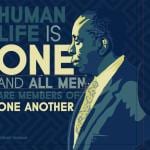The Adventurous Lectionary – Fourth Sunday after the Epiphany – February 2, 2020
Bruce G. Epperly
Micah 6:1-8
Psalm 15
I Corinthians 1:18-31
Matthew 5:1-12
Today’s scriptures turn our social norms upside down. The race is not always to the swift. The powerful don’t always win. Independence is a vice, and interdependence a virtue. Justice trumps profit and humility outlasts celebrity.
Micah charts this week’s lectionary adventure. The prophet proclaims God’s loving kindness. God has gracefully led the people to freedom. Without God they would be an enslaved people. Grace abounds, but grace also invites. Grace may even demand creative transformation so that we become our best selves, grace-receivers and grace-givers. The gracefulness of God calls us to gratitude and grace, embodied in ways that support our brothers and sisters. God’s primarily interest is not grand buildings and temples and glorious liturgies. God desires economic and relational justice, and care for the least of these. If you don’t hear the cries of the poor, you won’t hear God’s voice in worship.
As a daily walker of Cape Cod beaches, I appreciate Micah’s counsel to walk humbly with your God. We are on the move, never static, and learning about God’s ways with every step we take. God desires humility in relationship to the Divine. This humility is not a new form of subservience, for those who walk are agents of their destiny, but recognition that God’s vision and values are characterized by justice-seeking and gracefulness. If you want to be like God and live in harmony with God’s vision for you, let grace flow through you to others; let mercy especially to the vulnerable shape your behavior. Walk with, accompany, the lost and lonely, helping them find their way as God’s beloved children.
God loves beautiful things – just look at our planet – and God prizes creativity and ingenuity. But, the works of our hands, most especially our places of worship, should be embodiments of justice and love. Our self-affirmation should always be joined with God affirmation and care for our neighbor. Love justice, seek mercy, embrace your oneness with all creation.
The Psalms continue the emphasis on worship and justice. God seeks holiness. God desires lovely liturgies, but these fall flat without a corresponding concern that justice be done. Relationship is everything. Do our relationships bring beauty or ugliness to the world? Does our praise bring joy or sorrow to God? Does our worship send us out into the world as God’s healing companions?
The Corinthian passage is another reminder that relationship is everything, and in citing the cross as the paradigm of relatedness, Paul is inverting our social, economic, political, and ecclesiastical norms. Paul’s polarized readers must have been astounded by his words. They were divided by their linear win-lose advocacy of their theological and ecclesiastical viewpoints. They placed their theological party’s victory ahead of the well-being of their brothers and sisters in Christ. In contrast, Paul says the cross is everything. In contrast to the scorched earth politics of Caesar, God wins through suffering and weakness. In words that echo Philippians 2:5-11, divine power does not compete, defeat, or destroy; it unites, taking on human flesh, experiencing human suffering and winning by healing and companionship. If we place God’s relational vison at the forefront and live a cross-centered life, we can embrace and learn from the many diverse forms of Christianity, remembering that God speaks personally to each person and community and that we can grow in grace by learning from each other’s experiences of God. We are called to emulate God’s all-embracing vision, our faith is reflected in faithfulness not doctrinal purity, compassion not orthodoxy.
God’s wisest ones are not the power players or the celebrities, but those who recognize their dependence on God for all good things. Those who recognize their connectedness with all of life and their dependence on God’s grace reflect God’s own relationship with the world. God is, as the philosopher Alfred North Whitehead proclaims, the fellow sufferer who understands. God is also the loving companion who celebrates.
The preacher could easily spend a whole season on the Beatitudes. Each blessed virtue surprises and transforms. Each blessed virtue is the open door to creative interdependence. Those who are blessed know their weakness, vulnerability, and need for grace; they know that they need God and they need one another.
We need to be blessed and we need to bless each other. Our calling as followers of Jesus is to commit ourselves to giving and receiving blessings, and especially bless our most vulnerable members, our children, persons with disabilities, and elders. God blesses everyone and those who know their deepest needs – the protagonists of the Beatitudes – open their arms and hearts to receiving God’s and our care. The self-made person is most pitiable, the individualistic job creator is most benighted, according to scripture, because they can become prisoners of their so-called independence and forget that everything is grace, everything is gift, everything is dependent, on the love of God and on the efforts of those they often scorn.
There is a holy vulnerability in the Beatitudes that brings us home to the healing power of affirmative relationships. There is an ethical dimension to the Beatitudes, calling us to go beyond apathy to empathy, and self-interest to sharing in and responding to the suffering of the vulnerable and forgotten. Justice is inherent in giving and receiving blessing, and in receiving blessings we take our place as agents of justice and healing. This is not a welfare state but a blessed community, where all are welcome, all are cared for, all are encouraged to creativity, and all are invited to agency. The blessed and beloved community is that gloriously dynamic and interdependent body of Christ, described in I Corinthians 12, where all gifts are nurtured and all talents a gift to oneself and the community.
+++
Bruce Epperly is a Cape Cod pastor, professor, and author of over fifty books, including “One World: The Lord’s Prayer in a Process Perspective,” “Become Fire: Guideposts for Interspiritual Pilgrims,” and “The Mystic in You: Discovering a God-filled World.”













